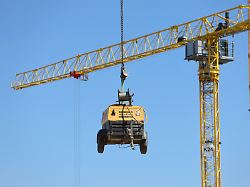expected decline in sales
Energy transition boom does not compensate for slack in construction
05/25/2023, 4:45 p.m
According to the construction industry, the energy transition offers great potential. But things are looking bleak in other areas at the moment. Residential construction in particular is in a full-blown crisis. The construction industry no longer rules out short-time work and job cuts.
The German construction industry fears lower sales in the current year due to the slump in residential construction. “Even the refurbishment area cannot compensate for the loss of sales,” said the chairman of the Federal Association of the Construction Industry (BVB), Marcus Nachbauer, in Berlin. Nominally, revenues should climb by two percent to 435 billion euros. Adjusted for price increases of around seven percent, this ultimately means a minus – specifically five percent in real terms. The decline in the main construction trade alone is due to the slump in demand for new residential construction. The association includes the main construction trades and companies in the so-called expansion such as painters, carpenters and roofers.
“In view of the fact that the financing costs have almost quadrupled, the investment budgets of home builders and investors are not sufficient,” emphasized Nachbauer. The orders from the previous year have largely been processed. “Now there is a threat of short-time work and job cuts.” Overall, the average number of employees in 2023 should remain largely stable at around 3.4 million. A decline of around 10,000 to 883,400 is expected in the construction industry and a slight decrease of 2,700 to 874,900 in expansion.
However, the building technology and services division is benefiting from climate protection and energy efficiency measures and is likely to increase the workforce by a good 13,000 to 1.64 million employees. The demand for energy efficiency measures, photovoltaic systems, charging stations for electric vehicles and heat pumps, services and renovation costs in the existing buildings is high, it said. The energy transition offers huge potential for the renovation sector.
Slump in orders in residential construction
The increasingly difficult situation in construction is reflected in the weak order situation. In the first quarter of 2023, orders in the main construction trades fell by almost six percent in nominal terms and by 19 percent when adjusted for inflation, according to the Federal Statistical Office. Although sales rose by 6.2 percent due to the sharp rise in construction prices, they fell by 8.2 percent when adjusted for inflation (real).
In the first three months, orders in residential construction in particular fell by 36 percent, emphasized the general manager of the German Construction Industry Association (HDB), Tim-Oliver Müller. “An improvement is not in sight, after all, housing permits are in free fall.” It is therefore no wonder that in April – according to a survey by the Munich IFO Institute – every third construction company complained about a lack of orders in residential construction. “In March it was still every fourth.”
The federal government had originally planned that around 400,000 apartments would be built in Germany every year. Despite a minimal increase, it was only 295,300 units in 2022. For the current year, the industry associations HDB and ZDB only expect around 250,000 new buildings.
“Can offer prospects even without a school-leaving certificate”
The political goal of building 400,000 apartments per year is correct, said Nachbauer. Also in view of the high immigration figures, the need for housing will increase. It is therefore urgently necessary to have long-term, adequate funding with clear and simple funding conditions and clearer interest rate support from the KfW development bank.
One of the biggest challenges for the construction industry is the struggle for skilled workers. The demand is already particularly high in the areas of sanitary, heating and air-conditioning technology as well as in the electrical area. It is now important to win all domestic potential. “We can also offer people without a school-leaving certificate good prospects through practical qualifications in the construction industry,” emphasized Nachbauer. “The ban on temporary work must be lifted.”
In addition, the construction industry is also dependent on immigration. Nachbauer called for amendments to the Skilled Immigration Act, which has so far been based solely on formal qualifications. “This falls short in practice, because we not only need highly qualified skilled workers, but also workers on the construction sites,” Nachbauer complained.
